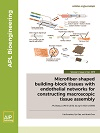
Bioengineering & Translational Medicine
Scope & Guideline
Unlocking the Potential of Bioengineering for All
Introduction
Aims and Scopes
- Tissue Engineering and Regenerative Medicine:
Research focused on developing biomaterials and scaffolds that support tissue regeneration and healing, including innovations in 3D bioprinting and cell-laden hydrogels. - Nanotechnology in Medicine:
Exploration of nanomaterials for drug delivery, imaging, and therapeutic applications, including the design and optimization of nanoparticles and nanocarriers. - Immunotherapy and Cancer Treatment:
Studies on the use of engineered immune cells, such as CAR T-cells and dendritic cells, along with novel adjuvants and delivery systems for enhancing cancer immunotherapy. - Biomaterials and Biocompatibility:
Focus on the development and assessment of new biomaterials that are biocompatible and can be used in various medical applications, including implants and drug delivery systems. - Regenerative and Personalized Medicine:
Research aimed at understanding and utilizing stem cells and other regenerative therapies for personalized treatment approaches in various diseases. - Medical Imaging and Diagnostic Technologies:
Advancements in imaging techniques and biosensors for improved diagnostics and monitoring of diseases, including point-of-care devices. - Mechanobiology and Bioengineering:
Investigation of how mechanical forces and properties of biomaterials affect cellular behavior and tissue development, contributing to better design of therapeutic strategies.
Trending and Emerging
- CRISPR and Gene Editing Technologies:
A surge in research utilizing CRISPR technology for gene editing and therapeutic applications, reflecting its potential to revolutionize treatment strategies for genetic disorders and cancers. - Point-of-Care Diagnostics:
Increasing focus on developing portable and rapid diagnostic tools that enable immediate clinical decisions, particularly in infectious diseases and chronic conditions. - Artificial Intelligence and Machine Learning in Medicine:
Emerging applications of AI and machine learning for data analysis, predictive modeling, and enhancing diagnostic accuracy, showcasing the integration of computational techniques in biomedical research. - Sustainable and Biodegradable Materials:
A growing interest in developing environmentally friendly materials for medical applications, emphasizing sustainability in bioengineering practices. - Microfluidics and Organ-on-a-Chip Technologies:
Rising research on microfluidic devices and organ-on-a-chip systems as powerful tools for drug testing, disease modeling, and personalized medicine. - Immunogenicity and Vaccine Development:
A heightened emphasis on vaccine development and immunogenic responses, particularly in the context of emerging infectious diseases and cancer immunotherapy.
Declining or Waning
- Traditional Pharmacology and Small Molecule Drugs:
Research on conventional small molecule drugs appears to be decreasing as interest shifts towards biologics, gene therapies, and nanomedicine, which offer more targeted and effective treatment options. - Invasive Surgical Techniques:
There is a noticeable decline in studies focused on invasive surgical procedures, as the field moves towards less invasive, bioengineering-based approaches such as tissue engineering and regenerative medicine. - Basic Laboratory Studies without Clinical Relevance:
Papers that focus solely on basic laboratory research without a clear translational or clinical pathway are becoming less common, as there is a growing focus on studies that directly contribute to clinical applications. - Conventional Imaging Techniques:
Research on traditional imaging methods is waning, with a shift towards more advanced, integrated imaging technologies that combine diagnostics and therapeutic monitoring.
Similar Journals

ACS Biomaterials Science & Engineering
Connecting Research and Application for a Healthier TomorrowACS Biomaterials Science & Engineering, published by the American Chemical Society, serves as a premier platform for the latest advancements and research in the fields of biomaterials and biomedical engineering. With an impressive impact factor and a strong reputation reflected in its ranking—Q2 in Biomaterials and Q1 in Biomedical Engineering—the journal attracts a diverse and engaged readership. Since its inception in 2015, it has aimed to foster innovation by publishing high-quality research articles, reviews, and perspectives on the synthesis, characterization, and application of biomaterials. Researchers and professionals benefit from the journal's rigorous peer-review process and its focus on translational science, making it essential for those looking to stay at the forefront of biomaterials research. Located in Washington, DC, USA, the journal plays a pivotal role in connecting academic and industrial sectors, ultimately driving advancements that impact biomedicine and related fields.

ANNALS OF BIOMEDICAL ENGINEERING
Advancing healthcare through engineering innovation.ANNALS OF BIOMEDICAL ENGINEERING is a premier journal in the field of biomedical engineering, published by Springer. Established in 1972, this journal has become a vital resource for researchers, professionals, and students engaged in the rapidly evolving domain of biomedical technology. With a commendable impact factor and ranked in the 76th percentile among its peers as per Scopus, it exemplifies excellence in disseminating critical research findings. The journal covers a broad scope of topics related to the integration of engineering principles with medical and biological sciences, facilitating innovations that enhance healthcare outcomes. Although open access is not offered in this journal, it remains an essential platform for scholarly communication, contributing to the continuous advancement of knowledge in biomedical engineering. ANNALS OF BIOMEDICAL ENGINEERING is not only a bridge for academics to share groundbreaking research but also an influential guide for practical applications in medicine and health technologies, making it a fundamental publication for its readership.

Annual Review of Biomedical Engineering
Unveiling Cutting-Edge Research in Healthcare TechnologyAnnual Review of Biomedical Engineering, published by Annual Reviews, stands as a leading academic journal dedicated to the rapidly evolving field of biomedical engineering. With an impressive impact factor that reflects its high citation rates and rigorous peer-review process, this journal offers critical insights by synthesizing cutting-edge advancements and applications in both biomedical engineering and miscellaneous medicine. The journal, which is available in both print (ISSN: 1523-9829) and electronic formats (E-ISSN: 1545-4274), serves as an essential resource for researchers, professionals, and students aiming to stay abreast of significant developments and emerging trends. As of 2023, it is recognized in the top tier (Q1) for both Biomedical Engineering and Medicine, showcasing its esteemed position within the academic community, reflected in its high Scopus rankings. Spanning from 1999 to 2024, the Annual Review of Biomedical Engineering continues to catalyze interdisciplinary collaboration and innovation at the intersection of engineering and healthcare.

Frontiers in Bioengineering and Biotechnology
Transforming Science: Where Bioengineering Meets BiotechnologyFrontiers in Bioengineering and Biotechnology, published by FRONTIERS MEDIA SA in Switzerland, stands as a leading platform for innovative research and developments in the fields of bioengineering and biotechnology. Since its inception in 2013, this Open Access journal has garnered significant recognition, reflected in its impressive category rankings: Q1 in Biomedical Engineering and Q2 in Bioengineering, Biotechnology, and Histology for 2023. With a focus on fostering collaboration and knowledge sharing, it aims to provide researchers, professionals, and students with access to pioneering studies that push the boundaries of science and technology. The journal, which is indexed in prominent databases, boasts high visibility and impact, evidenced by its impressive rankings across various categories in Scopus. As it continues to converge from 2013 to 2024, Frontiers in Bioengineering and Biotechnology is dedicated to shaping the discourse in its field and promoting advancements that have the potential to transform healthcare and environmental sustainability.

JOURNAL OF BIOMEDICAL MATERIALS RESEARCH PART A
Innovating the intersection of materials science and medicine.JOURNAL OF BIOMEDICAL MATERIALS RESEARCH PART A, published by WILEY, is a leading journal in the field of biomaterials and biomedical engineering, showcasing cutting-edge research that bridges the gap between material science and healthcare applications. With a robust 2023 impact factor reflecting its high-quality contributions, this journal is classified in the Q2 quartile for Biomaterials, Biomedical Engineering, and Ceramics and Composites, while achieving an impressive Q1 ranking in Metals and Alloys. The journal caters to a diverse readership, including researchers, professionals, and students, aiming to facilitate innovation and advancements in biocompatible materials and their applications in medical devices and tissue engineering. Access options for readers are available, ensuring the latest studies and findings are readily accessible to all stakeholders in this dynamic field. As it progresses towards its 2024 target, the JOURNAL OF BIOMEDICAL MATERIALS RESEARCH PART A continues to be an essential resource for anyone involved in the development and application of biomedical materials.

APL Bioengineering
Advancing Bioengineering for a Healthier TomorrowAPL Bioengineering is a premier open-access journal published by AIP Publishing, dedicated to advancing the field of bioengineering and its interdisciplinary applications. Established in 2017, this journal serves as a vital platform for researchers, professionals, and students interested in the critical intersections of bioengineering, biomaterials, biomedical engineering, and biophysics. With an impressive impact factor and consistent rankings in the Q1 category across multiple domains, including biochemistry and materials science, APL Bioengineering has positioned itself among the top journals in its field. The journal aims to publish innovative original research, comprehensive reviews, and insightful case studies that further the understanding and application of bioengineering principles. Since its inception, APL Bioengineering has fostered a community of thought leaders, providing open access to ensure broad dissemination of knowledge and advancements that underpin the future of biomedical innovation.

Materials Today Bio
Showcasing groundbreaking discoveries in bioengineering and biomaterials.Materials Today Bio, published by Elsevier, is an esteemed open-access journal dedicated to advancing the fields of bioengineering, biomaterials, and biomedical engineering. Since its inception in 2019, this journal has quickly made a name for itself, currently ranked Q1 in multiple categories including Bioengineering, Biomaterials, and Biotechnology, reflecting its exceptional quality and relevance in the rapidly evolving landscape of bio-related sciences. With an impressive Scopus ranking positioning it in the top 25% of its categories, Materials Today Bio provides a vital platform for researchers and professionals to share cutting-edge discoveries and innovative applications that bridge the gap between materials science and biological studies. Accessible to a global audience, this journal not only fosters collaboration among the scientific community but also aims to highlight significant advancements in cell and molecular biology, making it an indispensable resource for students and seasoned experts alike. The journal's commitment to open access since 2019 underscores its dedication to disseminating knowledge widely, ensuring that crucial findings reach those who can benefit from them the most.

Biomedical Engineering-Biomedizinische Technik
Empowering Professionals with Insightful Biomedical ResearchBiomedical Engineering-Biomedizinische Technik, published by WALTER DE GRUYTER GMBH, serves as a pivotal platform for advancing knowledge in the field of biomedical engineering and medicine since its inception in 1956. With an ISSN of 0013-5585 and an E-ISSN of 1862-278X, this peer-reviewed journal offers accessible insights into innovative research and technological advancements that are reshaping healthcare practices and biomedical applications. Although rated in the Q3 category for both Biomedical Engineering and Miscellaneous Medicine in 2023, the journal's impact factor and growing reputation demonstrate its vital role in fostering academic dialogue and collaboration. The journal is based in Germany, while its scope encompasses a diverse range of topics, thus bridging the gap between engineering and medical disciplines. Researchers, professionals, and students alike are encouraged to engage with the content that not only highlights contemporary challenges but also presents groundbreaking solutions in biomedical technology.

Nature Biomedical Engineering
Connecting Engineers and Scientists for Global ImpactNature Biomedical Engineering is a premier journal published by NATURE PORTFOLIO, focusing on innovative research at the intersection of engineering and biomedical sciences. With an ISSN of 2157-846X, this journal aims to disseminate groundbreaking studies that advance the field of bioengineering, biotechnology, and medical applications. Since its inception in 2017, it has rapidly earned a reputation for excellence, consistently achieving a Q1 ranking in various categories including Bioengineering and Biomedical Engineering, and receiving acclaim in prestigious Scopus rankings, boasting top positions in the fields of Computer Science Applications and Medicine. The journal operates under a rigorous peer-review process, ensuring that all published articles contribute substantially to the existing body of knowledge. Furthermore, it facilitates a broad accessibility model for researchers and practitioners, bolstering collaboration and innovation within the global scientific community. Nature Biomedical Engineering is not just a publication; it serves as a vital platform for thought leadership in the transformative field of biomedical engineering.

Biomaterials Advances
Exploring the Future of Bioengineering with BiomaterialsBiomaterials Advances is a premier journal published by Elsevier, dedicated to the rapidly evolving field of biomaterials. Established in the United Kingdom, this open-access journal aims to disseminate high-quality, peer-reviewed research that explores innovative biomaterial designs and their applications in bioengineering and biomedical engineering. With an impressive 2023 impact factor reflected in its Q1 rankings across multiple categories—including Bioengineering, Biomaterials, and Biomedical Engineering—Biomaterials Advances stands out as a critical platform for scholars and practitioners faced with advancing technologies and methodologies in the realm of materials science. Covering a broad range of topics, from biocompatibility to tissue engineering, this journal provides an inclusive forum for researchers seeking to contribute to the field. Its Scopus rankings further affirm its position as a leading resource, with notable standings in Biomedical Engineering (Rank #13), Biomaterials (Rank #8), and Bioengineering (Rank #11), all within the top percentiles. Researchers and students alike are encouraged to contribute and engage with the latest findings and innovations in biomaterials through this valuable publication.